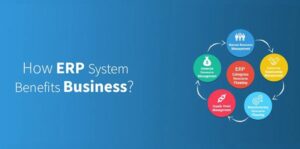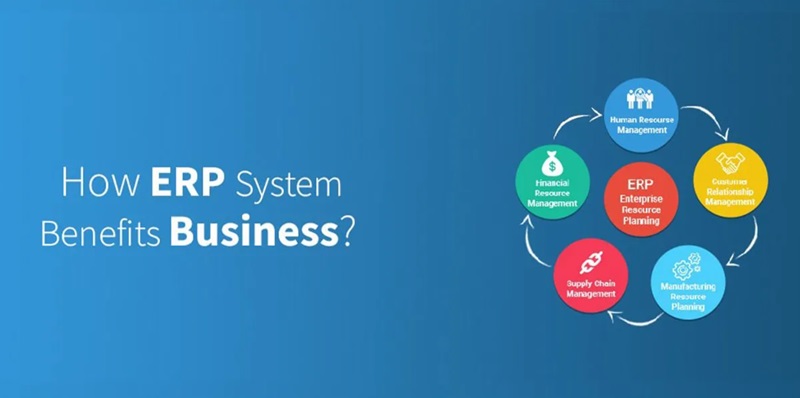In the fast-paced and highly competitive world of business, staying ahead of the curve and achieving rapid growth is a top priority for companies of all sizes. One powerful tool that can assist businesses in achieving this goal is Enterprise Resource Planning (ERP) software. ERP systems are integrated software solutions that streamline and automate various business processes, from finance and accounting to supply chain management and human resources. By facilitating better decision-making, improving operational efficiency, and enhancing collaboration, ERP systems can help businesses grow at a staggering rate. In this article, we will explore the ways in which ERP can drive business growth and the key benefits it offers.

Improved Operational Efficiency
Efficiency is a key driver of business growth, and ERP systems are designed to optimize operations across the organization. By integrating various functions, such as inventory management, production, and order processing, ERP software can help companies eliminate redundant processes and reduce manual data entry. This not only saves time but also minimizes errors, leading to smoother operations and improved customer satisfaction.
For example, a manufacturing company can use ERP to automate inventory tracking and reorder processes, ensuring that they always have the right amount of raw materials on hand. This reduces production delays and allows the company to meet customer demand more effectively. Improved operational efficiency not only leads to cost savings but also frees up resources for expansion and innovation.
Enhanced Decision-Making
In today’s data-driven business environment, making informed decisions is crucial for growth. ERP systems provide real-time access to accurate and up-to-date information, allowing businesses to make data-driven decisions more effectively. With ERP, managers can access key performance indicators (KPIs) and reports that provide insights into various aspects of the business, from sales and customer service to financial performance.
For instance, a retail company can use an ERP system to analyze sales data and customer trends, helping them identify which products are performing well and which are underperforming. Armed with this information, they can adjust their product offerings and marketing strategies to better meet customer demands, ultimately driving growth.
Streamlined Financial Management
Financial management is a critical aspect of business growth, and ERP systems offer robust tools for managing finances efficiently. With integrated financial modules, businesses can automate financial processes such as accounts payable, accounts receivable, and general ledger management. This streamlines financial operations and ensures accurate and compliant financial reporting.
Additionally, ERP systems provide comprehensive visibility into financial data, allowing businesses to identify cost-saving opportunities and allocate resources effectively. They can also help with budgeting and forecasting, enabling businesses to plan for future growth and investments.
Improved Customer Relationship Management
Building strong customer relationships is a fundamental driver of business growth. ERP systems often include customer relationship management (CRM) modules that help businesses track customer interactions, manage leads, and provide better service. By centralizing customer information and interactions, businesses can enhance customer satisfaction and drive repeat business.
For example, a service-oriented business can use CRM functionality within their ERP system to track customer inquiries, service requests, and follow-ups. This ensures that customer needs are addressed promptly and effectively, leading to increased customer loyalty and referrals.
Scalability
One of the primary advantages of ERP systems is their scalability. As a business grows, its requirements change, and ERP systems are designed to adapt to these evolving needs. Whether a company is expanding into new markets, adding product lines, or increasing its workforce, ERP software can be customized and configured to accommodate these changes. This flexibility allows businesses to grow without worrying about outgrowing their software solutions.
Enhanced Supply Chain Management
Efficient supply chain management is essential for businesses that rely on the timely procurement of raw materials and the efficient delivery of finished products to customers. ERP systems offer tools for optimizing supply chain operations, from demand forecasting to inventory management and logistics planning.
For instance, a distribution company can use ERP to track inventory levels, analyze demand patterns, and optimize their order fulfillment processes. This can lead to reduced carrying costs, minimized stockouts, and improved on-time delivery rates. As a result, the company can grow by serving more customers and expanding into new markets with confidence in their supply chain capabilities.
Better Compliance and Risk Management
In an increasingly regulated business environment, compliance and risk management are critical considerations for sustainable growth. ERP systems often include features that help businesses adhere to industry-specific regulations and manage risks effectively. By maintaining accurate records and automating compliance tasks, businesses can reduce the likelihood of fines and legal issues that can impede growth.
For example, a pharmaceutical company can use ERP to track the production and distribution of its drugs, ensuring compliance with strict regulations and safety standards. By minimizing compliance-related risks, the company can focus on expanding its product lines and entering new markets.
Collaboration and Communication
Effective collaboration and communication are essential for any growing business. ERP systems provide a centralized platform where employees across different departments can access and share information. This facilitates collaboration and improves communication, leading to increased productivity and better decision-making.
For example, a global organization can use ERP to connect its offices in different countries, enabling seamless communication and data sharing among teams working on the same project. This enhances coordination and knowledge sharing, ultimately promoting growth by leveraging the collective expertise of the organization.
Data Security
Data security is a paramount concern in today’s digital age, and ERP systems are equipped with robust security features to protect sensitive business data. They offer user-level access controls, encryption, and audit trails to ensure that only authorized personnel can access critical information. This safeguards data from theft, breaches, and other security threats, allowing businesses to focus on growth without compromising their data integrity.
Cost Savings
While implementing an ERP system can be a significant investment, it often results in long-term cost savings. By streamlining operations, reducing manual work, and optimizing resource allocation, ERP systems can significantly reduce operational costs. Businesses can reallocate these savings towards growth initiatives, such as marketing campaigns, research and development, or expansion into new markets.
Conclusion
In conclusion, ERP systems have the potential to help businesses grow at a staggering rate by improving operational efficiency, enhancing decision-making, streamlining financial management, and promoting customer relationship management. They offer scalability, supply chain optimization, compliance and risk management, collaboration and communication, data security, and cost savings. When implemented effectively, ERP software becomes a catalyst for business growth, providing the tools and insights necessary to stay competitive in today’s dynamic business environment. To harness the full potential of ERP, businesses must carefully evaluate their needs, choose the right ERP system, and ensure successful implementation and ongoing support. With ERP as a strategic tool, businesses can experience substantial growth and success.

